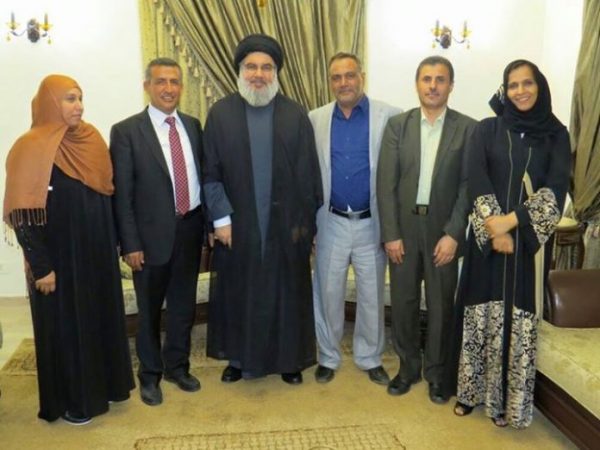
Yemen’s Infomation Minister called on the Lebanese government to stop Hezbollah’s support of Houthi rebels, insisting the group’s activity will prolong Yemen’s war.
On Sunday evening, Moammar Eryani said that Hezbollah is providing the Houthis with logistical and military assistance, turning the Beirut’s southern suburbs — known collectively as Dahiyah — into the location for media attacks on the Arab-led coalition.
At a speech by Hezbollah leader Hassan Nasrallah in mid-August to commemorate the anniversary of the 34-day 2006 war with Israel, the militia-cum-party had a reconstruction of a bus hit by a Coalition airstrike which had killed a number of civilians and children in Saada province several days earlier. The Arab-led force later said had been a mistake. The bus had been arranged for journalists to photograph, complete with actors, special effects smoke, red lighting and fake blood.
1.Hezbollah who is part of the Lebanese government, has not only provided logistical support, experiences & fighters to #Houthi_Iranian_Militia they transformed the southern suburb into media platform for managing the coup in Yemen.Attacking & distorting the coalition led by #KSA
— معمر الإرياني (@ERYANIM) September 29, 2018
“I call upon the Lebanese government and information minister to abide by the disassociation policy, to stop subversive and provocative activities,” Mr Eryani said in a series of Tweets, referring to Hezbollah’s activities.
All members of Lebanon’s cabinet, including Hezbollah, renewed their pledge to the official policy of disassociation from regional conflicts and affairs of other states late last year as a condition for Prime Minister Saad Hariri to rescind his resign made during a visit to Riyadh in November.
The minister also demanded that Beirut must stop Houthi’s Masirah TV broadcasting from the country.
“These illegal activities contribute to prolonging the war and Yemen’s stability and the relations between the two countries,” Mr Eryani said.
In August, Nasrallah voiced his support for the Houthi rebels by hosting a meeting with senior rebel political officials. He met with a delegation that included spokesman Mohamad Abdelsalam and council members Abdul Malik Al Ajri and Ibrahim Al Daylami.
A handout photo of the meeting was distributed by Hezbollah, Houthi and Iranian news outlets.
Nasrallah has praised the Houthis in speeches, saying they are fighting against ‘imperialism’, but has denied involvement in assisting the rebels over missiles. The Arab-led coalition – including Saudi Arabia and the UAE – intervened in the Yemen conflict in 2015 to back Mr Hadi’s government.
Earlier this year, the coalition reported it had killed eight Hezbollah fighters in northern Yemen, a claim the group denied.
In August, Saudi Arabia’s ambassador in Washington released evidence of Hezbollah’s deep involvement in the war in Yemen, including footage of commanders directing training for Houthi rebels.
Prince Khalid bin Salman used a Twitter thread to show documentary evidence that the Iranian-backed Lebanese group was overseeing units of the Houthi militia that ousted the country’s internationally-recognised government.
In July, Yemen’s Foreign Minister Khaled Al Yamani filed a complaint to the United Nations against Hezbollah.
Mr Yamani addressed his Lebanese counterpart Gebran Bassil, saying that he “regretted to point out that Hezbollah has abandoned the brotherly approach [between Yemen and Lebanon] … and abused the strong and established relations by its participation in training, planning, inciting and supporting the Houthi militias since the 2014 coup”.
The Yemeni minister urged the Lebanese authorities to take action against Hezbollah’s “hostile behaviour”.
The country’s civil war, which began when the Iran-backed rebels seized Sanaa, the capital, in September 2014, has left 22 million people — about 75 per cent of the population — in need of assistance, according to the UN.
THE NATIONAL

Leave a Reply
You must be logged in to post a comment.